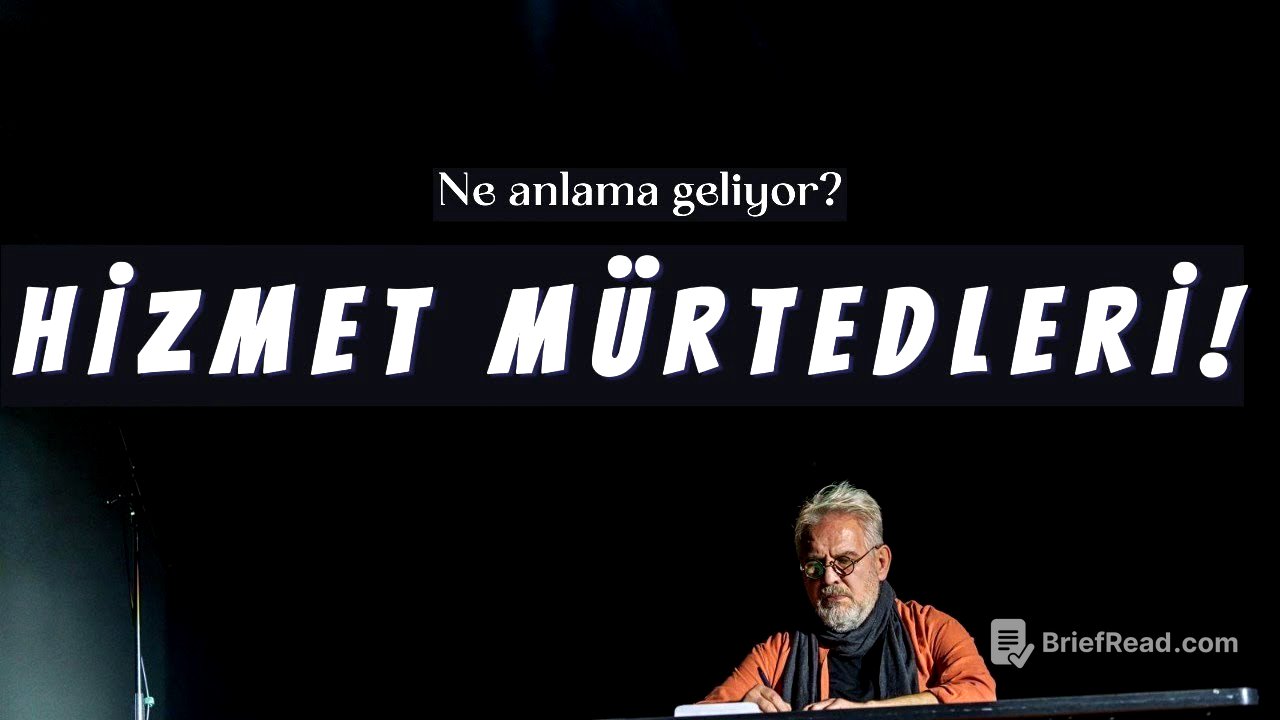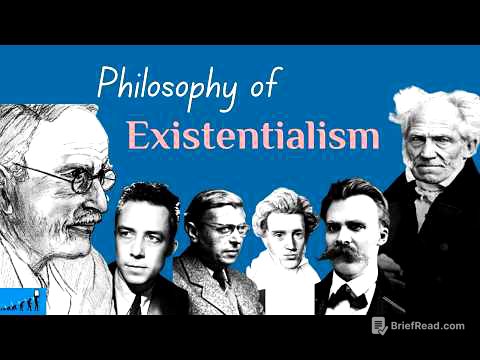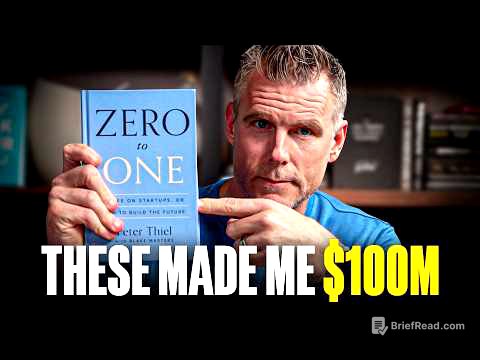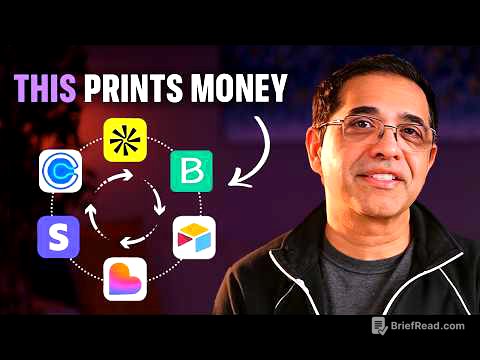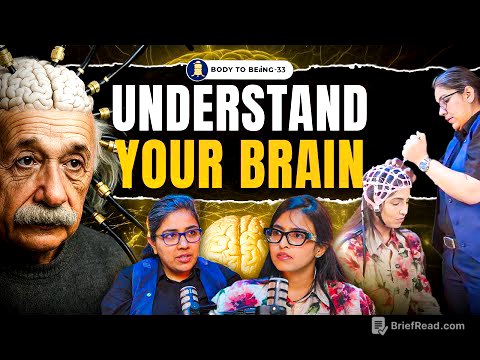TLDR;
The video discusses the concept of "service apostasy" within a religious community, particularly in the context of the Gülen movement. It explores the distinction between service (eternal and divine) and community (temporary and human), and how the perception of their relationship has evolved over time. The speaker analyzes the phases of the movement, from its early stages to the present, and suggests that the current period marks a return to individual growth and development after a phase of repression and disintegration.
- The speaker analyzes the concept of "service apostasy" within the Gülen movement.
- The video distinguishes between service (eternal and divine) and community (temporary and human).
- The speaker outlines the historical phases of the movement and its current state.
Introduction and Initial Thoughts [0:13]
The speaker begins by acknowledging the chaotic times and expressing that recent developments do not surprise him. He mentions the division within the service and congregation, stating that such occurrences are natural in any social group, especially after the death or aging of a leader, which can disrupt balance. He emphasizes the importance of understanding and correctly interpreting these processes, particularly in relation to Fethullah Gülen.
Defining the Scope and Addressing Concerns [3:54]
The speaker clarifies that the discussion will not involve accusing anyone of apostasy or betrayal. He references his articles on the subject, available on the TR724 website, and indicates that he has been contemplating this issue for a long time. He describes his approach as a mathematician, studying the origins, development, and future evolution of the service and community.
Historical Context: Shibi Abu Talib [5:38]
The speaker draws a parallel to the historical event of Shibi Abu Talib, where Muslims were boycotted and confined. He recounts the hardships faced by the Prophet Muhammad and his companions, emphasizing the constant questioning about when the ordeal would end. He relates this to a verse from the Quran, highlighting that trials and tribulations are a prerequisite for entering Paradise, similar to what earlier generations experienced.
Video Clip: Fethullah Gülen on Service Apostasy [9:01]
A video clip featuring Fethullah Gülen discusses the concept of "service apostasy." Gülen explains that while some individuals may abandon their faith or Islam, others may initially engage with and then abandon the service due to worldly interests or fear. He describes these individuals as having weak character, being servants of the world and the devil, and ultimately exposing their own stupidity. He notes that such individuals often criticize those they were previously associated with, raising questions about their judgment and motivations.
Analysis of Gülen's Concept of Service Apostasy [12:51]
The speaker clarifies that the term "service apostasy" originates from Fethullah Gülen himself. He explains that Gülen introduced this concept in 2014, shortly after the 17-25 events, as pressure on the community was increasing but before the coup attempt. The speaker interprets Gülen's statement as a deterrent, warning against deviations from the community. He also mentions Osman Şimşek's question about individuals becoming fixated on trivial matters and losing their initial enthusiasm for service, leading to backbiting and gossiping.
Distinguishing Service from Community [15:12]
The speaker emphasizes the distinction between service and community, defining service as the historical manifestation of the divine word of God, an eternal and everlasting mission. Community, on the other hand, is the temporary manifestation of this mission, carried out by specific people in a particular geography during a certain period. He references Emmanuel Kant's concepts of nomenclature (divine, cosmic reality) and phenomenal (sociological reality) to further illustrate this distinction.
Phases of the Service Movement [17:25]
The speaker presents an infographic illustrating the phases of the service movement. He identifies the 1960s as a period where service and community were represented individually by Hoca Efendi. In 1972, the first phase began with housing projects, followed by dormitories. By 1986, with the introduction of schools, service and community became closely intertwined, reaching a peak in 1996 with international expansion. After the 2016 coup attempt, the speaker believes service and community began to diverge again.
Post-2016 Division and New Phase [20:55]
The speaker explains that after 2016, the community divided into three groups: a resilient core (60%), those drifting away but still maintaining love for the service (30%), and those completely separated due to fear, disappointment, and anxiety (10%). He reiterates the key distinctions between service (eternal, divine, universal) and community (temporary, human, local).
The Concept of Service Apostates and Kant's Philosophy [22:37]
The speaker revisits the concept of "service apostates," noting that it was introduced by Hodja Effendi as operations began. He emphasizes that the prediction of this concept came true after 2016. He connects these ideas to Kant's philosophy, describing service as having an ontological status (divine, spiritual) and community as appearing phenomenal (sensory).
Summary of the Movement's Evolution and Current State [25:01]
The speaker summarizes the evolution of the movement, identifying key phases: the individual Renaissance (1960-1972), housing services in the 70s, prep schools in the 80s, media reception in the 90s, and repression and disintegration (2013-2016). He suggests that the movement has now returned to an individual Renaissance period, with individuals developing their own education, knowledge, and global citizenship. He concludes that what the teacher means by "service apostates" is actually community apostates, as being an apostate in the service is ontologically problematic.
Concluding Remarks [28:11]
The speaker believes that the current situation is not the end but a cycle coming to a head again. He mentions the extensive research and graphs he has prepared, drawing from various philosophers like Spinoza, Plato, Marx, and Weber. He expresses hope that his comprehensive book on the subject will be published one day. He thanks the audience for joining and encourages them to share the publications and contribute if possible.
